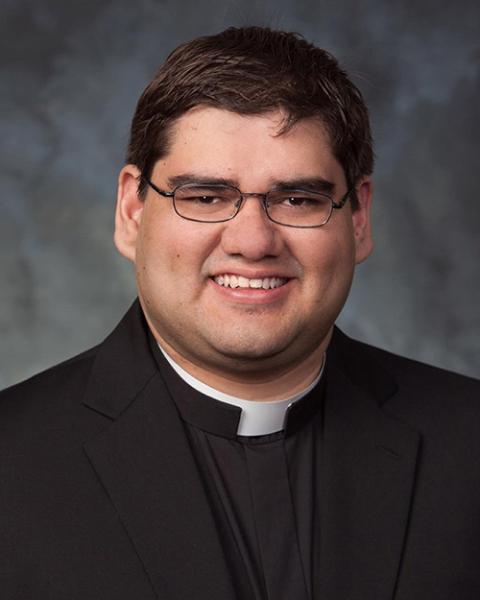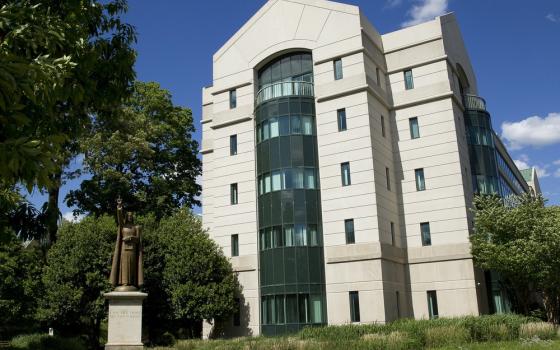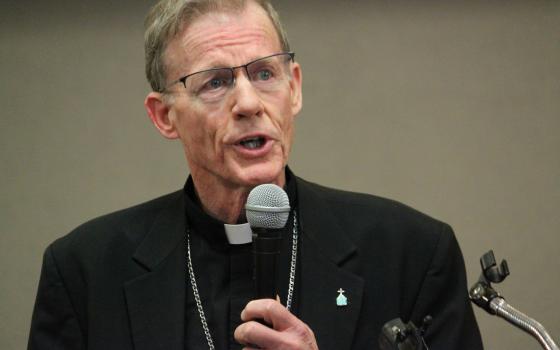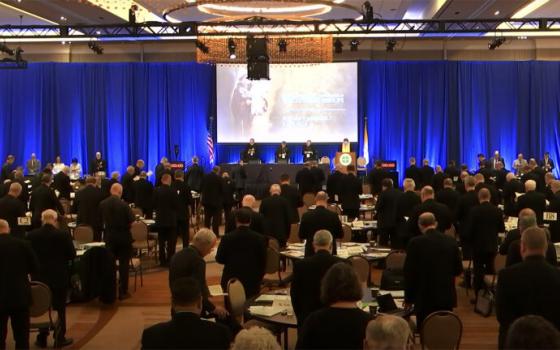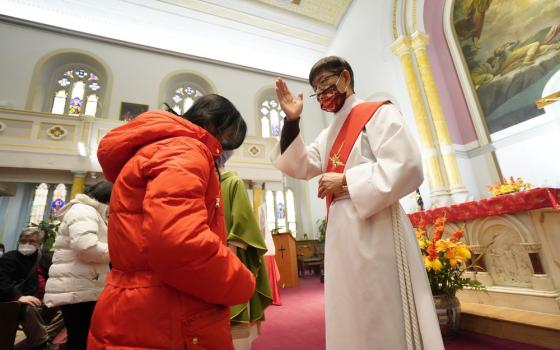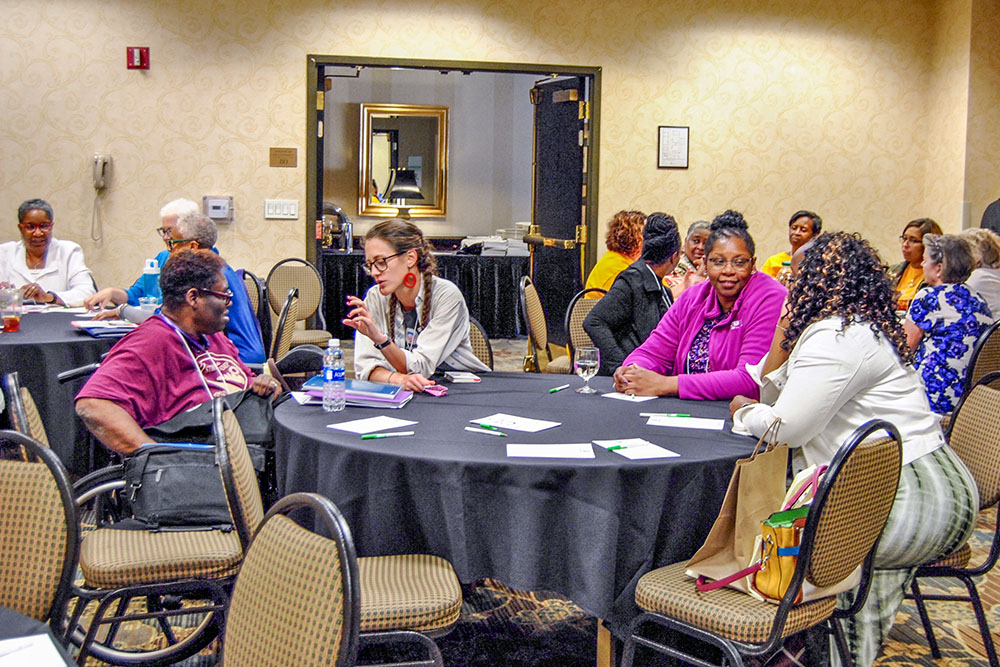
People converse during a Gamaliel Network training in a 2017 file photo. The network, a national organization that trains faith leaders in community organizing principles, has received funding from the Catholic Campaign for Human Development. (Flickr/Gamaliel Network)
Catholic social justice activists, and even a bishop, were pleasantly surprised at the overwhelming support that U.S. Catholic prelates showed for their conference's anti-poverty program during a closed-door executive session in Louisville.
Because of financial challenges, sources told NCR that the Catholic Campaign for Human Development may still need to scale back its grant funding in the immediate future, but they added that the campaign will continue its work to break the cycle of poverty in local communities.
"Obviously, there's some work to do, but I consider this a miracle. It seems the bishops were 100% supportive, and that's pretty amazing," said Fr. Guillermo Treviño Jr., co-president of Escucha Mi Voz Iowa, a faith-based, immigrant-led community organization that has received grant funding from the Catholic Campaign for Human Development.
Ana Garcia-Ashley, the executive director of Gamaliel Network, a national organization that trains faith leaders in community organizing principles, told NCR that the bishops showed "their hearts were in the right place" amid pressing challenges facing the church in the United States.
"We are people of faith, we are hard workers, passionate about this ministry, and we can definitely get the resources we need for this important work if we get out there and tell our stories," said Garcia-Ashley, whose network has also received funding from the Catholic Campaign for Human Development.
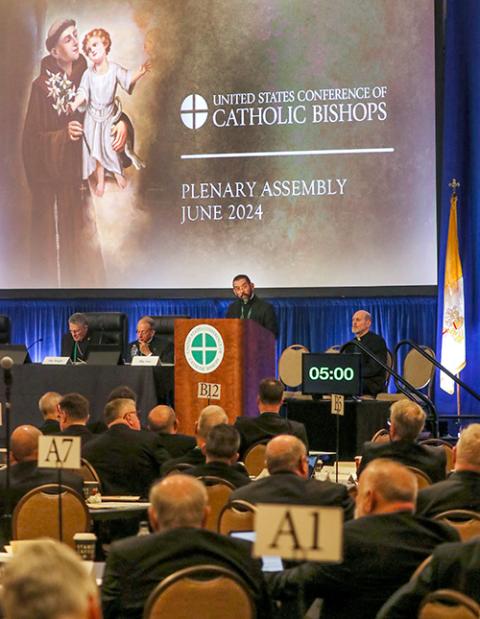
Bishop Daniel Flores of Brownsville, Texas, speaks June 13 at the U.S. Conference of Catholic Bishops' Spring Plenary Assembly in Louisville, Kentucky. (OSV News photo/Bob Roller)
On June 13 in Louisville, where they gathered for their spring plenary assembly, the nation's Catholic bishops met in executive session to discuss the future of the U.S. Conference of Catholic Bishops' anti-poverty program, given questions about its financial stability and recent spending decisions.
Described before the assembly as a venue for the bishops to continue "discerning the next 50 years" of the campaign, which was founded in 1969, several sources told NCR that the overwhelming majority of bishops rallied to the program's defense during the executive session.
With the exception of a small minority that opposed the program, the bishops who spoke out during the closed-door meeting demanded that the conference take no steps to eliminate the program, which has been reviled for decades by far-right Catholic groups. In recent weeks, social justice groups and Catholic activists had written letters to individual bishops and the conference in an effort to prevent the U.S. Catholic Church from retreating in its advocacy for systemic social justice reforms.
"There were many very supportive comments made in favor of retaining CCHD. It was a pleasant surprise," said Bishop John Stowe of Lexington, Kentucky. Stowe is a member of the bishops' subcommittee for the Catholic Campaign for Human Development.
Because the campaign has reportedly depleted its reserve account and last year went into deficit spending, Stowe told NCR that it will need to find ways to stretch its budget and reimburse the bishops' conference, which he said lent money to the campaign.
However, Stowe said the subcommittee has yet to receive "a clear financial report" from the bishops' conference that "lays out" the complete financial picture of the Catholic Campaign for Human Development.
In 2022, the most recent year for which information is publicly available, the campaign operated at a $5.7 million deficit, spending about half of the $17 million it had in net assets at the beginning of the year to award about $12.7 million to 192 grant recipients, despite only taking in about $9.2 million in total revenue that year.
Speaking with reporters following the June 13 public session, Military Services Archbishop Timothy Broglio, president of the bishops' conference, said the Catholic Campaign for Human Development was "initially told to spend down their resources."
"Unfortunately, they did that better than perhaps was desirable," Broglio said.
Several years ago, the program had more than $40 million in its long-term reserve fund, but began spending that money when campaign and conference officials agreed that it did not make sense for an anti-poverty program to hold a large amount of cash in the bank. The campaign doled out millions of dollars in grants, including during the COVID-19 pandemic in 2020 when national collections cratered as churches closed and later reopened with strict attendance restrictions.
Advertisement
Jesuit Fr. Tom Reese, a journalist who has covered the bishops' conference for decades, told NCR that the latest drama surrounding the Catholic Campaign for Human Development felt to him like "deja vu."
"This is something that's happened before," Reese said. "Typically what happens is a couple of bishops get up and complain, then the mass of bishops get up and say how wonderful it is in their diocese, that they love it and it's doing great things. After all that, then they do some minor tinkering with guidelines and policies."
The bishops were indeed asked to consider new guidelines and policies during their June 13 executive session, according to a discussion guide obtained by NCR.
Described as "a possible direction forward," the discussion guide proposed restating the theological framework for the Catholic Campaign for Human Development, "aligning it within the church's social magisterium, especially the twofold focus" of Paragraph 36 in Dignitas Infinita, the document on human dignity that the Vatican released on April 2.
In the cited paragraph, the Vatican document notes that the "scandal of glaring inequalities continues, where the dignity of the poor is doubly denied because of the lack of resources available to meet their basic needs and the indifference shown toward them by their neighbors."
The discussion guide also raised the possibility of the Catholic Campaign for Human Development awarding grants that "develop specific economic or community development initiatives," citing as examples vocational training, work opportunities, worker-owned cooperatives, leadership training, and affordable housing. Several groups that receive funding from the campaign are already involved in those types of projects.
"These grants will address the structural problems causing the lack of resources on the local level," states the discussion guide, which also proposed that the campaign's fund award a small annual grant to the bishops' conference to continue education programs that "will help address the indifference found in and outside of the Church."
Broglio said several bishops provided feedback to the campaign subcommittee, which he said "will need to review all the comments and then incorporate the advice into their ongoing work of ensuring that the program is positioned to serve the needs of those striving to overcome poverty."
Stowe told NCR on June 14 that the subcommittee had not yet seen those recommendations. Despite a May 31 email that grant recipients received indicating that their applications would not be approved for the next grant cycle, Stowe said that he expects the campaign will award "some" of those grants.
Treviño, who is also a pastor of two churches in Iowa that serve meatpacking plant communities, said the Catholic Campaign for Human Development's grant funding allowed Escucha Mi Voz Iowa to recently send a busload of migrant workers to Des Moines to attend a federal court hearing.
"Thanks to CCHD. We couldn't do it without them," Treviño, said.
Meanwhile, Garcia-Ashley of Gamaliel Network, which has 44 affiliated agencies in 13 states, said she is now focusing on getting the word out to increase the national collection for the Catholic Campaign for Human Development, which normally coincides with the World Day of the Poor in November.
"There's a lot of realities that we have to deal with," she said. "We need to support our bishops and our dioceses, but that does not stop us from being focused on what Pope Francis calls us to do, and what our faith calls us to do, and that is to care for the least of these."

